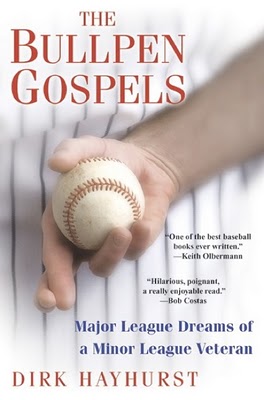Book Review: Bullpen Gospels by Dirk Hayhurst
 Halfway through Dirk Hayhurst’s Bullpen Gospels it occurred to me that I was reading one of the best books on baseball, ever.
Halfway through Dirk Hayhurst’s Bullpen Gospels it occurred to me that I was reading one of the best books on baseball, ever.
That’s some strong talk, particularly for someone who hasn’t read the entire baseball canon. But I’m getting there - just about every other book I read is about baseball.
I’ve devoured Jim Bouton’s Ball Four more than five times, I loved John Feinstein’s Living on the Black and Michael Lewis’ Moneyball. Also, as fans of this blog know, I’ve reviewed the graphic novel Satchel Paige:Striking Out Jim Crow as well as Sports Illustrated’s Great Baseball Writing.
The Bullpen Gospels slot in right above all of those, including Ball Four, my previous titleholder.
They’re comparable books too. Both are written by professional baseball players who find themselves pitching long relief in a bullpen full of odd characters. Yes, Bouton was an established major leaguer trying to master the knuckleball while Hayhurst, at that point, was a career minor leaguer in the San Diego Padres organization, but they’re still pretty similar books.
Bouton’s book is infamous for exposing the real lives of baseball heroes like Carl Yastrzemski and Mickey Mantle at a time when they were idolized by most fans. The aging Seattle Pilots reliever took a lot of heat for the book, with many people saying Bouton was a gloryhound. I don’t agree with that sentiment, but it certainly reads like an expose.
Love it or hate it, Ball Four is a hilarious and insightful read. But, by contrast, the Bullpen Gospels is a much more genuine and sensitive story.
Starting with Hayhurst’s truly dire home life with an unbalanced grandmother and a fractured family crippled not by one, but two, alcoholics you immediately feel for the young reliever. When he moves on to spring training and the minor leagues you can’t help but appreciate his sense of humour.
Perhaps the most noticeable difference between Hayhurst and Bouton is that the former rarely criticizes his teammates or the Padres’ executives. On the few occasions when he does speak poorly of someone, it is a reasonable and measured critique, and he shies away from dropping big names for the sake of glamour.
The only person Hayhurst is really hard on is himself.
Gospels is a quick read that makes its way through an entire baseball season, with a truly joyous ending. It also imparts a better understanding of what life in the minors is like for aspiring ballplayers. Hayhurst is an effortless and charming writer. He’s likeable and always sincere in his beliefs.
I’d recommend this book to anyone, particularly as a companion to Jim Bouton’s Ball Four.